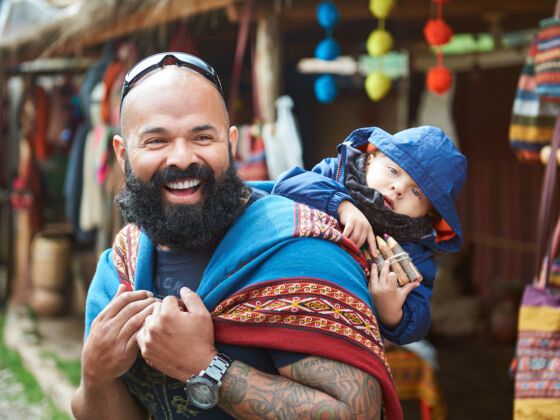When you’re traveling alone in a foreign country, there are certain inalienable safety rules that appear so rudimentary that they almost go without saying: Don’t get into cars with unknown men. Don’t give anyone your passport. Don’t put your blind trust in strangers. Well, one clammy night in Peru, I violated all three of those rules in just a few short hours. Welcome to the strange world of Latin American border crossing, where it’s advisable to leave your gut instinct back in the big cities and stifle all the advice your mother has ever given you.


Blindly Trusting Strangers at a Border Crossing Gave Me Back Faith in Humanity
I arrived in Tacna (Southern Peru) after catching a bus from Arequipa, where I’d then cross the border into Arica, which is the first town in the north of Chile, via another bus. It was the first time since landing in Lima five weeks prior that I was alone — I had left my friend in Arequipa, six hours away.
Tacna International Bus Station assaulted and screamed at all my senses on arrival: it was a cauldron of frantic noise, heat, and chaos interspersed with wearied travelers slumping on bits of pavement as they waited to leave this strange abyss. I wandered into the terminal building, in the hope of finding a ticket machine (oh, so naïve), or perhaps a friendly and conveniently placed helper who would advise me on my next move. Instead, as I moved through the building, I was barraged by a stream of insistent taxi drivers all offering me a ride over the border. I had been in South America long enough to know that this is standard, but it always unnerved me. I ambled back outside and joined a queue after the people in line in front of me confirmed that they were all waiting to go to Arica.
And I waited.
One hour. Two hours.
The queue was moving, but not particularly in any order. Taxis would inexplicably pick up people behind me, and I’d watch them zoom off in a trail of smugness and dust. All the while, the sun edged toward the horizon as nightfall creeped closer.
I had visions of being stuck in this dreary pit-stop town, of sleeping outside in a place I didn’t know, all the while thinking, Nobody knows me here, and nobody knows I’m here. Under different circumstances, I could see how that might feel liberating.
Eventually, a taxi driver scoured the crowd calling out, “solo uno, solo uno!” and I just about tripped over my limbs and baggage trying to run to him. If I could personify the image of “frantic,” it would be embodied by this guy. He never quite slowed his pace to a walk, and his movements were scrambled and jerking as he zipped around his taxi, taking my bag, and tossing it in the back. “Passport!” He demanded from me, impatiently beckoning with his hand. I looked inside the car from where eight expectant eyes blinked at me. “Hurry up, you big blonde moron,” they seemed to say. I obliged, because there was no other option, handing over my passport to this total stranger.
We trundled off into the darkness. I assessed my surroundings. Four Peruvian men, five including the driver, were in the car with me. Nobody spoke. We sped along dark country roads, the last miles of my time in Peru passing me by in a blur. I gazed out the window, wondering vaguely if someone was going to sell my kidneys on the black market. I had decided that there was a good chance I could outrun these guys — the one next to me was, promisingly, on the larger side. I would just run to Chile until I’d hit civilization, and hopefully avoid any rabid desert dogs on the way. Just as I was getting my escape plan together, the driver gave me my passport back.
When we arrived to the vicinity of the official border crossing, two of our party inexplicably jumped out the car and started walking. Twenty minutes later, the rest of us — including the driver — got out. For reasons completely unbeknownst to me, our little group had somehow skipped the queue. I was following them blindly through each checkpoint as we weaved amongst the crowds, all of a sudden bound to these strangers amongst the sea of people. At one awful moment, as I passed my backpack through security, I lost sight of them all. Then I heard one of my stranger-friends call out to the other in Spanish, “We’ve lost our gringo! Where is she?”
On being referred to as “their” gringo, my heart nearly burst open with relief and I waved and yelled, “Estoy aqui!” Somewhere between leaving Tacna and crossing into Chile, these guys had grown some taken responsibility to look out for me — they carried my bag back to the taxi, they opened the taxi door for me, one even gave me a high five after I got my stamp.
We continued on until we reached Arica, and I said goodbye and thank you as we went our separate ways into the night. I never really thanked them enough.
In hindsight, your fears can seem almost fantastical. But at the time, they are very real: you feel them in your quickened heartbeat and the blood pulsing in your brain. Standing by myself in that Tacna bus station, I felt completely alone, vulnerable, and scared for myself.
In traveling, there exists that strange tension between always being more conscious of your surroundings and more guarded than normal, juxtaposed with often having to trust something without having all the facts. Throw in language barriers and schedules that don’t run on time, and you often resort to a more intrinsic mode of survival: trusting other people.
Sometimes, there’s really no other option but to put all your blind faith in the kindness of strangers and embrace the unknown.